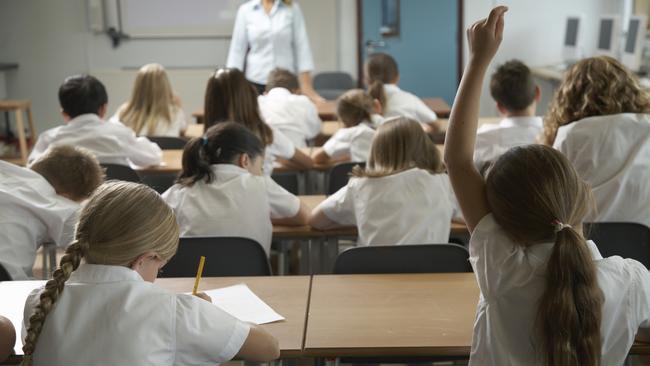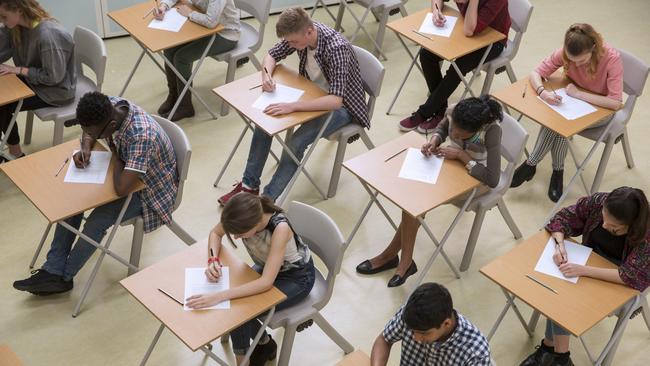The Catholic school NAPLAN push should have parents’ worries of Australia’s Choose Your Own Adventure eased | Maiden
A Catholic school “experiment” should spell the end of Australia’s Choose Your Own Adventure approach to teaching kids.
Opinion
Don't miss out on the headlines from Opinion. Followed categories will be added to My News.
If you’re a parent or grandparent you’re probably worried sick or sick of reading about how Australian schools are failing to teach children how to read, write and understand basic mathematics.
It’s always about the problem and rarely about the solution.
Sometimes, there’s the unmistakeable scent of denialism in the air as a devoted army of armchair experts claim there’s nothing to see here.
Alternatively, someone is arguing there is a problem and it will all be fixed if we just pour more money into the existing system.

That is, schools simply need more teachers using the same failing methods in smaller classes.
But every now and again evidence emerges that challenges current methods of teachings and suggests there is another way.
That evidence dropped with an unmistakeable thud in the latest round of NAPLAN results.
An education experiment trialling old-school methods of “direct instruction’’ in 56 Catholic schools in the ACT and Goulburn has yielded a remarkable turnaround in these schools’ NAPLAN results. Similar experiments are now being conducted in Victoria and NSW.
NAPLAN is an annual national assessment for all students in Years 3, 5, 7 and 9, and is the only nationwide assessment that all Australian children undertake.
The Catholic schools involved in the “experiment” turned out to constitute 13 of the 20 schools flagged by the Australian Curriculum Assessment and Reporting Authority as “making a difference’’ in the ACT.
The list of the Top 20 schools in Canberra according to NAPLAN results is dominated by low-fee Catholic schools in the capital’s outer suburbs.
There are just two public schools on the entire top 20, a shameful result that should prompt action.
Despite the fact that only a quarter of schools in the ACT are Catholic, they made up two-thirds of ACARA’s list of schools that outperformed others with a similar background of parental occupation and education.
To understand why this is such an extraordinary turnaround you need to understand that some of the schools in the ACT-Goulburn catchment include schools in regional NSW that were previously on the list of institutions that were among the most underperforming schools in the state.

What changed? The simple answer is that the Catholic schools embraced an old-school approach that the diocese called Catalyst which features explicit teaching as opposed to the student-led, choose your own adventure experiment prevalent at many schools.
Other conversations followed. Initially, it was thought there wasn’t evidence to suggest that kids learning their times tables was important to building maths skills.
The experiment suggested otherwise. Sometimes the experiment has involved turning back the clock even where children sat in the class.
At some schools, the kids were not always sitting in groups anymore – they are now sitting in rows and receiving explicit instructions.
The director of Catholic Education for the Archdiocese of Canberra and Goulburn Ross Fox says that the dramatic improvement in results has also had other side effects. Disruptive behaviours have reduced and teachers were saving up to five hours a week in lesson preparation because the program provides lesson plans.
The promotional material around Catalyst sometimes seems a bit like the usual education gobbledegook.
It provides “a consistent approach to teaching and learning across the Archdiocese, based on the best available research on how students learn, retain and retrieve information.”
But what does that mean? It sounds like commonsense. Can it really be that different to the way other schools are teaching?
Ross Fox believes it is different.
“What happens at the moment is most schools exist on a system where you get a registered teacher, you employ a principal with some school experience, and you let him go for it. It’s almost as loose as that,’’ he says.
“Humans have a bias for novelty. With education that’s on steroids. We like the new shiny thing. We’ve got every trendy idea about how kids learn.
“You’ve got this idea that kids just need to be nurtured to learn and grow. There’s a counter view, which is actually, civilisation has learned so many things. We should teach the kids about it.
“We’ve got two ideas. There’s the science of reading, which says decoding and vocabulary are really important. So you teach kids to decode the words, you teach them vocabulary, and then they can sort of get on to make meaning. That’s much simpler than the reality, but it’s pretty close.
“And then the other thing is the science of learning. So science of learning says if you’ve got lots of knowledge in your long term memory, you can do amazing things that you wouldn’t be able to do because your short term memory is limited to something like four to seven items before it gets overwhelmed and you can’t do anything.
“So a lot of our work is actually trying to get stuff into long term memory so the kids have got it to apply to problems and issues that they encounter.”
Catalyst is based on the scientific concept of “cognitive load theory’’, working to embed information in students’ long-term memory.
For Ross Fox, the light bulb moment arrived when took on the job eight years ago and spoke to parents at one of the local schools.
“And this parent, she said to me, ‘Oh, it’s just such a lovely school’. And she spoke for five minutes about how welcoming it was, how friendly, how supportive. And then she summed it up with, ‘It’s just a real pity about your academic results, the NAPLAN results, they’re not very good.’
“And so the simple way I describe it is that what parents want is they want the kids to be safe, they want them to be happy, and they want them to learn. And they’re willing to compromise on learning for ‘safe and happy.’
“And I just think that’s not good enough for professional educators. We’ve got to be safe, happy and learning all the time, and until you can get to the learning you’re not a real school.
“Safe and happy does not transform lives. It doesn’t overcome inequalities. It is almost like babysitting. Maybe some of the kids who come from privileged backgrounds they’ll self actualise because of amazing home life.
“And for a parent to say it so directly to me, I just thought, hang on... You shouldn’t come to a Catholic school and then trade-off learning.”
More Coverage
Originally published as The Catholic school NAPLAN push should have parents’ worries of Australia’s Choose Your Own Adventure eased | Maiden






